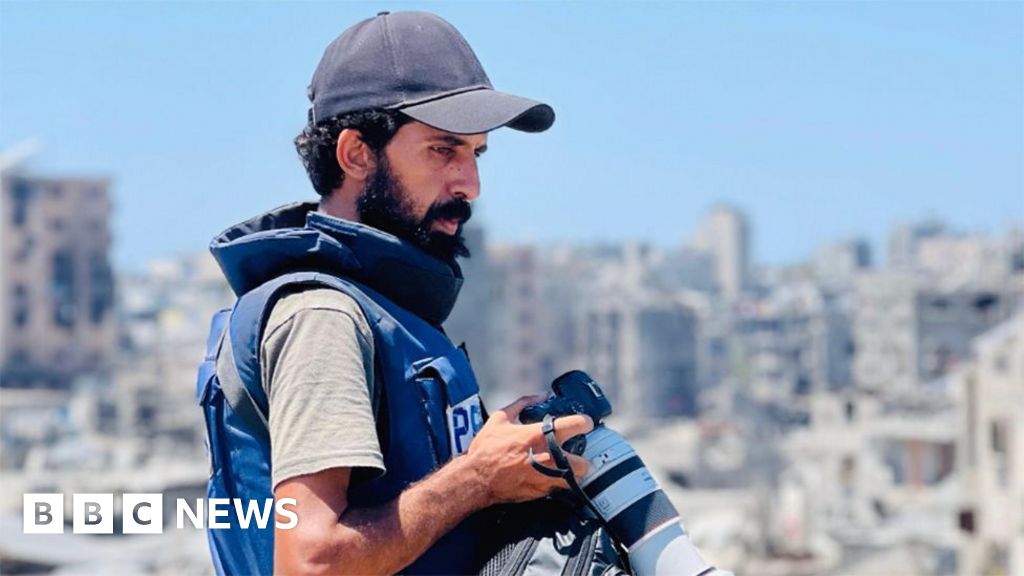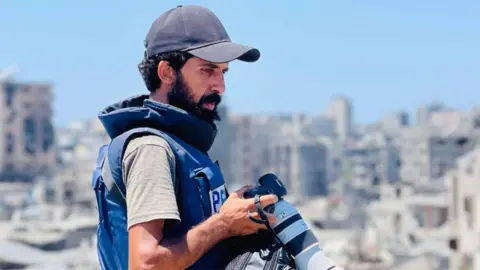 The BBC
The BBCFacebook severely limited the ability of Palestinian news outlets to reach an audience during the Israel-Gaza war, according to a BBC investigation.
In a comprehensive analysis of Facebook data, we found that newsrooms in the Palestinian territories – in Gaza and the West Bank – experienced a sharp decline in audience engagement since October 2023.
The BBC also saw leaked documents showing that Instagram – another platform owned by Meta – increased its moderation of comments by Palestinian users after October 2023.
Meta – the owner of Facebook – says any suggestion that it has deliberately suppressed certain voices is “unequivocally false”.
Since the start of the Israel-Gaza war, only a few outside reporters have been allowed to enter the Palestinian coastal territory of Gaza from the outside, and they have only been able to do so under escort by the Israeli army.
Social media has filled the gap for those who want to hear more voices from inside Gaza. Facebook pages for news outlets such as Palestine TV, the Wafa news agency and the Palestinian Al-Watan News – which operate out of the West Bank – have become a vital source of updates for many people around the world.
BBC News Arabic collected engagement data on the Facebook pages of 20 prominent Palestine-based news organizations in the year leading up to the October 7 Hamas attacks on Israel and the year after.
Engagement is a key measure of how much influence a social media account has and how many people see its content. It includes factors such as the number of comments, reactions and shares.
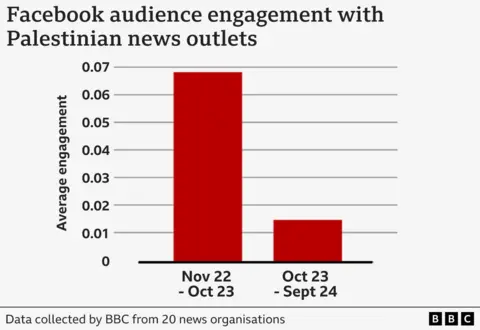
During a period of war, audience engagement can be expected to increase. However, the figures show a 77% drop since the October 7, 2023, attacks by Hamas.
Palestine TV has 5.8 million followers on Facebook. Newsroom journalists shared with us statistics showing a 60% drop in the number of people seeing their posts.
“Interaction was completely limited and our posts stopped reaching people,” said Tariq Ziad, a journalist at the channel.
Over the past year, Palestinian journalists have raised concerns that their online content is being “shadow banned” by Meta – in other words, limited in how many people see it.
To test this, we performed the same data analysis on the Facebook pages of 20 Israeli news organizations such as Yediot Ahronot, Israel Hayom, and Channel 13. These pages also posted a large amount of war-related content, but their audience engagement increased by nearly 37 %.
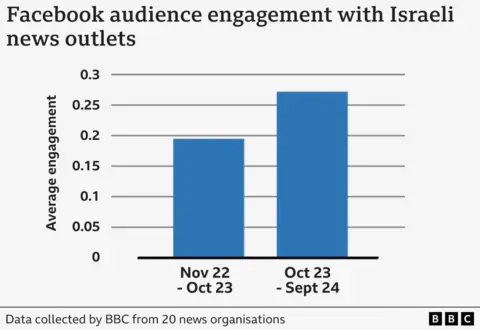
Meta has previously been accused by Palestinians and human rights groups in lack of fair moderation of online activity.
A 2021 independent report commissioned by the company said this was not intentional, but due to a lack of Arabic-speaking experience among moderators. Words and phrases were interpreted as offensive or violent when they were in fact harmless.
For example, the Arabic phrase “Alhamdulillah,” which means “Glory to God,” is sometimes automatically translated as “Glory to God, the Palestinian terrorists are fighting for their freedom.”
To see if this explains the decline in engagement with Palestinian outlets, the BBC did the same analysis on the Facebook pages of 30 prominent Arabic-language news sources based elsewhere, such as Sky News Arabia and Al-Jazeera.
However, these pages saw an average increase in engagement of nearly 100%.
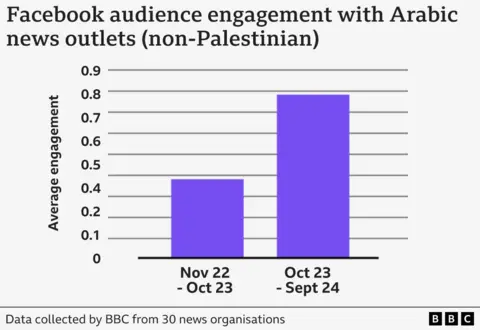
In response to our inquiry, Meta indicated that it was not hiding “temporary product and policy measures” taken in October 2023.
He said he was challenged to balance the right to free speech with the fact that Hamas is both sanctioned by the US and designated as a dangerous organization under the Meta policy.
The tech giant also said pages posting exclusively about the war were more likely to affect engagement.
“We acknowledge that we make mistakes, but any suggestion that we are deliberately suppressing a particular voice is unequivocally false,” a spokesman said.
Leaked Instagram documents
The BBC also spoke to five former and current Meta employees about the impact they believe their company’s policies have had on individual Palestinian users.
One person, who spoke anonymously, shared leaked internal documents about a change made to Instagram’s algorithm that strengthened the moderation of Palestinians commenting on Instagram posts.
“Within a week of the Hamas attack, the code was changed, making it more aggressive towards the Palestinian people,” he said.
Internal reports indicate that an engineer expressed concern about the order, worried that it could “introduce a new bias into the system against Palestinian users.”
Meta confirmed it had taken the measure, but said it was necessary to respond to what it called a “surge in hateful content” coming from the Palestinian territories.
It said the policy changes introduced at the start of the Israel-Gaza war had now been reversed, but did not say when that happened.
At least 137 Palestinian journalists have reportedly been killed in Gaza since the conflict began, but several continue despite the dangers.
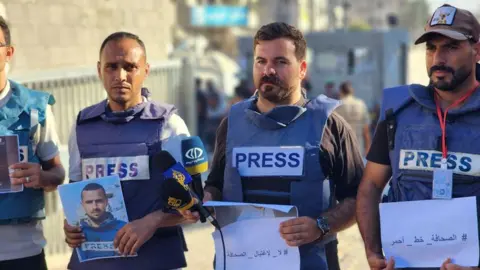 Getty Images
Getty Images“A lot of information cannot be published because it is too graphic – for example if the (Israeli) army carries out a massacre and we film it, the video will not be distributed,” said Omar el Kataa, one of the few photojournalists who chose to stay in the northern part of Gaza.
“But despite the challenges, risks and content bans,” he says, “we must continue to share Palestinian content.”
Additional reporting by Rehab Ismail and Natalie Merzougi
https://ichef.bbci.co.uk/news/1024/branded_news/75d2/live/9a4ab640-bb9a-11ef-a2ca-e99d0c9a24e3.jpg
2024-12-18 00:22:21

